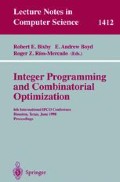Abstract
We introduce an algorithm that solves the maximum flow problem without generating flows explicitly. The algorithm solves di- rectly a problem we call the maximum s-excess problem. That problem is equivalent to the minimum cut problem, and is a direct extension of the maximum closure problem. The concepts used also lead to a new parametric analysis algorithm generating all breakpoints in the amount of time of a single run.
The insights derived from the analysis of the new algorithm lead to a new simplex algorithm for the maximum flow problem — a pseudoflow-based simplex. We show that this simplex algorithm can perform a parametric analysis in the same amount of time as a single run. This is the first known simplex algorithm for maximum flow that generates all possible breakpoints of parameter values in the same complexity as required to solve a single maximum flow instance and the fastest one.
The complexities of our pseudoflow algorithm, the new simplex algo- rithm, and the parametric analysis for both algorithms are O(mnlog n) on a graph with n nodes and m arcs.
Research supported in part by NEC, by NSF award No. DMI-9713482, and by SUN Microsystems.
Access this chapter
Tax calculation will be finalised at checkout
Purchases are for personal use only
Preview
Unable to display preview. Download preview PDF.
References
W. H. Cunningham. A network simplex method. Mathematical Programming, 1:105–116, 1976.
G. Gallo, M. D. Grigoriadis and R. E. Tarjan. A fast parametric maximum flow algorithm and applications. SIAM Journal of Computing, 18(1):30–55, 1989.
A. V. Goldberg and R. E. Tarjan. A new approach to the maximum flow problem. J. Assoc. Comput. Mach., 35:921–940, 1988.
D. Goldfarb and W. Chen. On strongly polynomial dual algorithms for the maximum flow problem. Special issue of Mathematical Programming B, 1996. To appear.
D. Goldfarb and J. Hao. A primal simplex method that solves the Maximum flow problem in at most nm pivots and O(n2m) time. Mathematical Programming, 47:353–365, 1990.
D. S. Hochbaum. A new — old algorithm for minimum cut on closure graphs. Manuscript, June 1996.
H. Lerchs, I. F. Grossmann. Optimum design of open-pit mines. Transactions, C.I.M., LXVIII:17–24, 1965.
J. C. Picard. Maximal closure of a graph and applications to combinatorial problems. Management Science, 22:1268–1272, 1976.
Author information
Authors and Affiliations
Editor information
Editors and Affiliations
Rights and permissions
Copyright information
© 1998 Springer-Verlag Berlin Heidelberg
About this paper
Cite this paper
Hochbaum, D.S. (1998). The Pseudoflow Algorithm and the Pseudoflow-Based Simplex for the Maximum Flow Problem. In: Bixby, R.E., Boyd, E.A., Ríos-Mercado, R.Z. (eds) Integer Programming and Combinatorial Optimization. IPCO 1998. Lecture Notes in Computer Science, vol 1412. Springer, Berlin, Heidelberg. https://doi.org/10.1007/3-540-69346-7_25
Download citation
DOI: https://doi.org/10.1007/3-540-69346-7_25
Published:
Publisher Name: Springer, Berlin, Heidelberg
Print ISBN: 978-3-540-64590-0
Online ISBN: 978-3-540-69346-8
eBook Packages: Springer Book Archive

